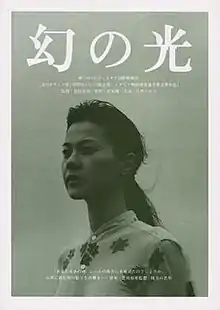Maborosi
Maborosi, known in Japan as Maboroshi no Hikari (Japanese: 幻の光, literally "phantasmic light", but best translated as 'a trick of the light'), is a 1995 Japanese drama film by director Hirokazu Kore-eda starring Makiko Esumi, Tadanobu Asano, and Takashi Naito. It is based on a novel by Teru Miyamoto.
| Maborosi | |
|---|---|
 | |
| Directed by | Hirokazu Kore-eda |
| Produced by | Naoe Gozu |
| Screenplay by | Yoshihisa Ogita |
| Based on | Maboroshi no Hikari by Teru Miyamoto |
| Starring | Makiko Esumi Tadanobu Asano Akira Emoto Sayaka Yoshino Takashi Naito |
| Music by | Chen Ming-chang |
| Cinematography | Masao Nakabori |
| Edited by | Tomoyo Ōshima |
| Distributed by | Milestone Films |
Release date |
|
Running time | 109 minutes |
| Country | Japan |
| Language | Japanese |
The film won a Golden Osella Award for Best Cinematography at the 1995 Venice Film Festival.
Plot
Yumiko (Esumi) and Ikuo (Asano) are a young Osaka couple who have a new baby. One day Ikuo is walking along the railway tracks and is hit and killed by a train. It seems that he may have done this deliberately yet there is no apparent motive. A few years pass. Yumiko agrees to an arranged marriage with a widower, Tamio (Naitō), and she and Yuichi (her son, now played by Gohki Kashima) move to Tamio's house in a rustic village on the Sea of Japan coast, shot on location in Wajima, on the Noto Peninsula (the actual location where the film was shot is Uniumachi, about 5 km west from Wajima along the coast).
A drunken spat over a bell Yumiko had given Ikuo just before he died causes Yumiko and Tamio to discuss their strong emotions for their lost loves. Shortly after, Yumiko follows a funeral procession and lingers at the crematorium, until Tamio arrives by car to pick her up, at which point she says she just wants to know why Ikuo killed himself. Tamio suggests that, like the will o' the wisps his father used to see, perhaps something just drew him away from life.
Critical reception
On Rotten Tomatoes, Maborosi has a rating of 100% based on 23 reviews, with an average score of 8.08/10.[1] Critic Roger Ebert praised the film, noting its "astonishing beauty and sadness" and the influence of Japanese filmmaker Yasujiro Ozu.[2]
See also
- List of films with a 100% rating on Rotten Tomatoes, a film review aggregator website
References
- "Maboroshi no hikari (Maborosi) (Illusion) (1995)". Rotten Tomatoes. Fandango. Retrieved 2019-07-01.
- Ebert, Roger (March 21, 1997). "Maborosi". RogerEbert.com. Retrieved September 15, 2020.
Bibliography
- Guthmann, Edward (29 November 1996). "FILM REVIEW -- The Delicate House of `Maborosi': Japanese film a lovely meditation on meaning of life". San Francisco Chronicle. Retrieved 15 September 2009.
- Thomas, Kevin (26 October 1996). "Maborosi: 'Maborosi' Takes Powerful Journey of Spirit". The Hartford Courant. Archived from the original on 12 June 2011. Retrieved 15 September 2009.
- Thompson, Nathaniel (2006) [2002]. DVD Delirium: The International Guide to Weird and Wonderful Films on DVD; Volume 1 Redux. Godalming, England: FAB Press. pp. 453–454. ISBN 1-903254-39-6.
External links
- Maborosi at IMDb
- Maborosi at the Japanese Movie Database (in Japanese)
- Maborosi at AllMovie
- Maborosi at Box Office Mojo (2016, 2019 reissues)
- Maborosi at Metacritic
- Maborosi no hikari at Rotten Tomatoes